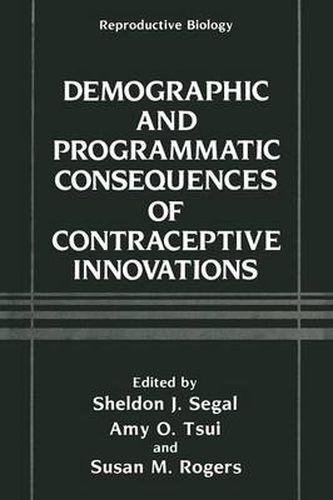Readings Newsletter
Become a Readings Member to make your shopping experience even easier.
Sign in or sign up for free!
You’re not far away from qualifying for FREE standard shipping within Australia
You’ve qualified for FREE standard shipping within Australia
The cart is loading…






This title is printed to order. This book may have been self-published. If so, we cannot guarantee the quality of the content. In the main most books will have gone through the editing process however some may not. We therefore suggest that you be aware of this before ordering this book. If in doubt check either the author or publisher’s details as we are unable to accept any returns unless they are faulty. Please contact us if you have any questions.
This volume contains papers presented at the Conference on the Demographic and Programmatic Consequences of Contraceptive In novations, which was sponsored by the Committee on Population and held at the National Academy of Sciences, October 6-7, 1988. The papers consider how new contraceptive methods currently being developed and changes in the use of already available contraceptives could affect contraceptive practice, levels and patterns of abortion use, and the health of women. In addition, several of the papers re view the probable consequences of introducing new technology into family planning programs in developing countries. The Committee on Population sponsored this conference in order to stimulate think ing and to provide a forum for scientists, family planning program managers, and donor agency personnel to exchange information and ideas about these important issues. The committee is publishing these papers to expand the discussion of consequences of contracep tive innovations and to give scientists, policy makers, and members of the public who could not attend the conference an opportunity to learn about new developments in fertility control and their likely consequences for individuals and the societies in which they live. NEED FOR NEW METHODS While a strong case can be made that the pill and the intrauterine device (IUD) have contributed to declines in the level of unintended pregnancies around the world, it is also clear that for many couples existing methods present problems.
$9.00 standard shipping within Australia
FREE standard shipping within Australia for orders over $100.00
Express & International shipping calculated at checkout
This title is printed to order. This book may have been self-published. If so, we cannot guarantee the quality of the content. In the main most books will have gone through the editing process however some may not. We therefore suggest that you be aware of this before ordering this book. If in doubt check either the author or publisher’s details as we are unable to accept any returns unless they are faulty. Please contact us if you have any questions.
This volume contains papers presented at the Conference on the Demographic and Programmatic Consequences of Contraceptive In novations, which was sponsored by the Committee on Population and held at the National Academy of Sciences, October 6-7, 1988. The papers consider how new contraceptive methods currently being developed and changes in the use of already available contraceptives could affect contraceptive practice, levels and patterns of abortion use, and the health of women. In addition, several of the papers re view the probable consequences of introducing new technology into family planning programs in developing countries. The Committee on Population sponsored this conference in order to stimulate think ing and to provide a forum for scientists, family planning program managers, and donor agency personnel to exchange information and ideas about these important issues. The committee is publishing these papers to expand the discussion of consequences of contracep tive innovations and to give scientists, policy makers, and members of the public who could not attend the conference an opportunity to learn about new developments in fertility control and their likely consequences for individuals and the societies in which they live. NEED FOR NEW METHODS While a strong case can be made that the pill and the intrauterine device (IUD) have contributed to declines in the level of unintended pregnancies around the world, it is also clear that for many couples existing methods present problems.